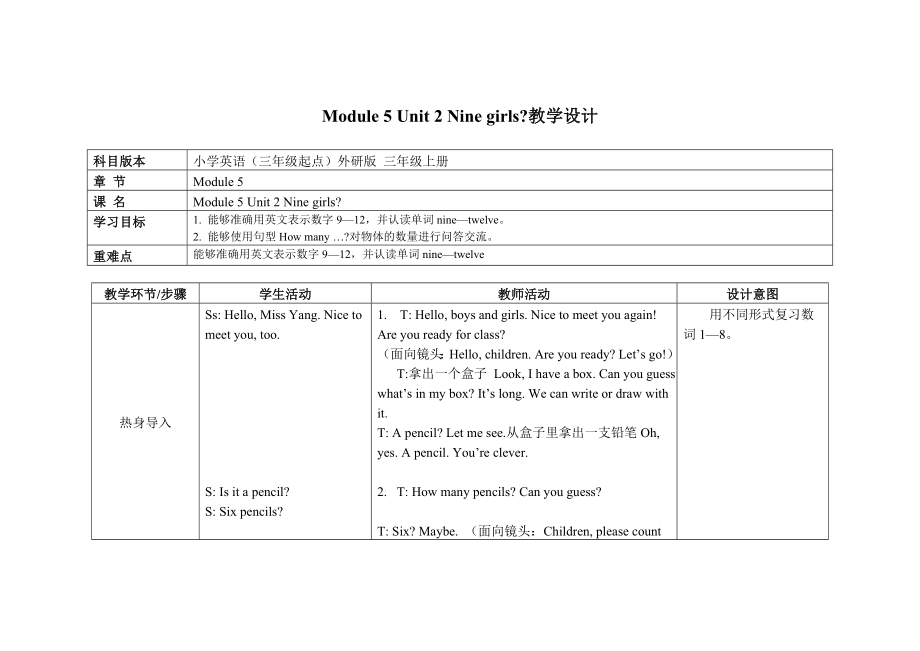《三年級(jí)上冊(cè)英語(yǔ)教案 Module 5 Unit 2 Nine girls外研社(三起)》由會(huì)員分享�����,可在線閱讀�,更多相關(guān)《三年級(jí)上冊(cè)英語(yǔ)教案 Module 5 Unit 2 Nine girls外研社(三起)(6頁(yè)珍藏版)》請(qǐng)?jiān)谘b配圖網(wǎng)上搜索。
1���、Module 5 Unit 2 Nine girls?教學(xué)設(shè)計(jì)
科目版本
小學(xué)英語(yǔ)(三年級(jí)起點(diǎn))外研版 三年級(jí)上冊(cè)
章 節(jié)
Module 5
課 名
Module 5 Unit 2 Nine girls?
學(xué)習(xí)目標(biāo)
1. 能夠準(zhǔn)確用英文表示數(shù)字9—12����,并認(rèn)讀單詞nine—twelve���。
2. 能夠使用句型How many …?對(duì)物體的數(shù)量進(jìn)行問(wèn)答交流���。
重難點(diǎn)
能夠準(zhǔn)確用英文表示數(shù)字9—12�,并認(rèn)讀單詞nine—twelve
教學(xué)環(huán)節(jié)/步驟
學(xué)生活動(dòng)
教師活動(dòng)
設(shè)計(jì)意圖
熱身導(dǎo)入
Ss: Hello, Miss Yang. Nice to me
2��、et you, too.
S: Is it a pencil?
S: Six pencils?
Ss: Eight pencils.
學(xué)生分男生組和女生組進(jìn)行單詞朗讀賽���。
Girls: … stars.
Boys: … stars.
1. T: Hello, boys and girls. Nice to meet you again! Are you ready for class?
(面向鏡頭:Hello, children. Are you ready? Let’s go!)
T:拿出一個(gè)盒子 L
3�����、ook, I have a box. Can you guess what’s in my box? It’s long. We can write or draw with it.
T: A pencil? Let me see.從盒子里拿出一支鉛筆Oh, yes. A pencil. You’re clever.
2. T: How many pencils? Can you guess?
T: Six? Maybe. (面向鏡頭:Children, please count with us.)Let’s count together. One, two, three …
4、eight. How many pencils?
T: You did a good job. I think maybe you can have a competition.
在黑板上貼出男女孩頭像�����,示意孩子分成兩組進(jìn)行���。
(面向鏡頭:孩子們��,現(xiàn)在演播室里的孩子們要分成兩組進(jìn)行讀單詞比賽��,也請(qǐng)你加入�����,和他們比一比看誰(shuí)讀的又快又準(zhǔn)吧?。?
3. T: Boys! and girls, are you ready? Go
4. T: Who is the winner? How many stars do you have, girls?
T: How about boys
5、?
T: Oh, …s are the winners. Let’s clap for them.
用不同形式復(fù)習(xí)數(shù)詞1—8����。
采用男女生競(jìng)賽的形式,一方面幫助孩子復(fù)習(xí)所學(xué)單詞�����,另一方面為后面的第一個(gè)動(dòng)畫學(xué)習(xí)做準(zhǔn)備����。
新知呈現(xiàn)
學(xué)生觀看第一個(gè)動(dòng)畫,初步感知�、學(xué)習(xí)數(shù)字nine, ten.
Ss: Five stars.
Ss: No.
Ss: One, two, three … ten.
學(xué)生看詞卡,跟老師拼讀并學(xué)習(xí)單詞nine, ten.
S: 看詞卡朗讀單詞nine, ten
6���、.
學(xué)生看動(dòng)畫跟讀��,模仿動(dòng)畫中的語(yǔ)音語(yǔ)調(diào)��。
學(xué)生做游戲:看到9���、10則快速朗讀單詞���;其他數(shù)字不讀。
學(xué)生看第二個(gè)動(dòng)畫�,學(xué)習(xí)數(shù)字eleven, twelve;并初步感知Nine girls? Eleven boys?的含義��。
Ss: Ten girls.
Ss: No. Twelve boys.
請(qǐng)兩個(gè)學(xué)生面向鏡頭教讀單詞�。
再次整體回顧單詞9—12.
1. T: Look, they have a competition, too. Who are the winners? Let’s watch the vide
7、o.
(面向鏡頭:在故事中的男孩子們和女孩子們也進(jìn)行了一場(chǎng)學(xué)習(xí)競(jìng)賽����,讓我們來(lái)看一看他們誰(shuí)是勝利者吧!)
教師播放第一個(gè)動(dòng)畫
2. T: Look here. How many stars?
T: Boys have five stars. Girls have eight stars?
T: How many stars? Try to count! One, two ….
3. 用詞卡學(xué)習(xí)nine, ten���。
T: Look at this word. Please read after me. 分音節(jié)拼讀學(xué)習(xí)單詞。
(面向鏡頭:Hello, chil
8����、dren. Please read after me. nine, 9,nine�;ten,10�����,ten)
4. T: Who can read?
5. T: Well done! Let’s play a game.
(面向鏡頭:下面請(qǐng)和我們一起做個(gè)游戲,如果你在屏幕上看到了我們剛剛學(xué)習(xí)的nine,9, ten,10�,就請(qǐng)你朗讀出來(lái)吧!)
T: Ready! Numbers are coming!
6. T: You did very well. Let’s back to their school. Look, Miss Smart is coming. How ab
9�����、out the children? Is everybody here? Let’s watch.
(面向鏡頭:Miss Smart準(zhǔn)備上課了�,孩子們都到齊了嗎?我們一起看看動(dòng)畫吧?。?
教師播放第二段動(dòng)畫
T: How many girls?
T: How many boys? Eleven boys?拿著eleven詞卡問(wèn)。
7. 用詞卡學(xué)習(xí)單詞eleven, twelve.
e-le-ven
tw-el-ve
T: Who can read for the children in the classroom?
(面向鏡頭:Can you
10����、 read? I think you did a good job.)
8. T: Look at the new words. Let’s read again.
將兩個(gè)動(dòng)畫分開學(xué)習(xí),讓學(xué)習(xí)每一個(gè)動(dòng)畫的目標(biāo)更加明確:學(xué)習(xí)第一個(gè)動(dòng)畫時(shí)��,學(xué)生重點(diǎn)學(xué)習(xí)數(shù)字nine, ten的表達(dá)�;
游戲鞏固數(shù)詞nine, ten
學(xué)習(xí)第二個(gè)動(dòng)畫時(shí),學(xué)生重點(diǎn)學(xué)習(xí)數(shù)字eleven, twelve�,理解How many girls/ boys? 以及Nine girls?/ Eleven boys?的含義。這樣的學(xué)習(xí)可以降低孩子在學(xué)習(xí)
11�����、本節(jié)課新知時(shí)的難度��。
分步訓(xùn)練
Ss: …
Ss: …
Ss: Dog.
Ss: Eleven dogs.
學(xué)生根據(jù)圖片上的內(nèi)容回答
S1: How many cats/ red caps/ blue caps?
S2: …
1. T: 教師將9—12四個(gè)單詞抽走一張What’s missing?
(面向鏡頭:你看出哪個(gè)單詞不見(jiàn)了嗎?)
T: Yes. You’ve got it.
2. 課件呈現(xiàn)T: What is missing?
What are m
12�����、issing?
3. T: Wow, super! Let’s clap for all of you!
4. 課件播放狗叫聲T: Oh, what’s that?
T: 課件出小狗圖片Yes. It’s a dog. How many dogs? Please remember.
(面向鏡頭:Hi, children. 請(qǐng)記住畫面中一共有多少只小狗)課件出許多小狗圖片后迅速消失:
How many dogs?
(面向鏡頭:How many dogs?)
T: Eleven dogs?(出圖)Yes. Good memory.
5. T: It’s your
13���、turn. Can you ask?課件呈現(xiàn)圖片��。
鞏固本節(jié)課所學(xué)數(shù)詞nine-twelve
操練句型How many的回答�。
學(xué)生操練句型的問(wèn)句和答語(yǔ)���。
嘗試應(yīng)用
學(xué)生練習(xí)�。
S1: How many …?
S2: …
Ss一起再數(shù)一數(shù)星星�����,回顧內(nèi)容��。
1. T: I think this picture is easy for you. Look at this picture. Wow, a lot of things. You can ask and
14�����、write down your answers.
(面向鏡頭:也請(qǐng)你們?cè)囍妥约旱耐榫毩?xí)問(wèn)答�,并記下圖中物品的數(shù)量吧!)
1. T: Who can show?
教師根據(jù)學(xué)生的回答課件呈現(xiàn)答案���。
2. T: So great! Two stars for each of you! How many stars?
T: The homework for today is …
能在實(shí)際情境中運(yùn)用所學(xué)的句型��。
作業(yè)布置
今天我們學(xué)會(huì)了如何詢問(wèn)某種物品的數(shù)量�,以及數(shù)字1—12�����。大家都學(xué)會(huì)了嗎��?今天課后請(qǐng)你觀察一下自己房間或家里的物品以及它們的數(shù)量����,然后和你的小伙伴一起分享一下吧!
課堂內(nèi)容小結(jié)
進(jìn)步標(biāo)志
1. 能夠準(zhǔn)確說(shuō)出并認(rèn)讀單詞9—12:nine, ten, eleven, twelve���。
2. 學(xué)生能夠聽(tīng)懂問(wèn)句How many …? 并回答物品的數(shù)量���。
 三年級(jí)上冊(cè)英語(yǔ)教案 Module 5 Unit 2 Nine girls外研社(三起)
三年級(jí)上冊(cè)英語(yǔ)教案 Module 5 Unit 2 Nine girls外研社(三起)

